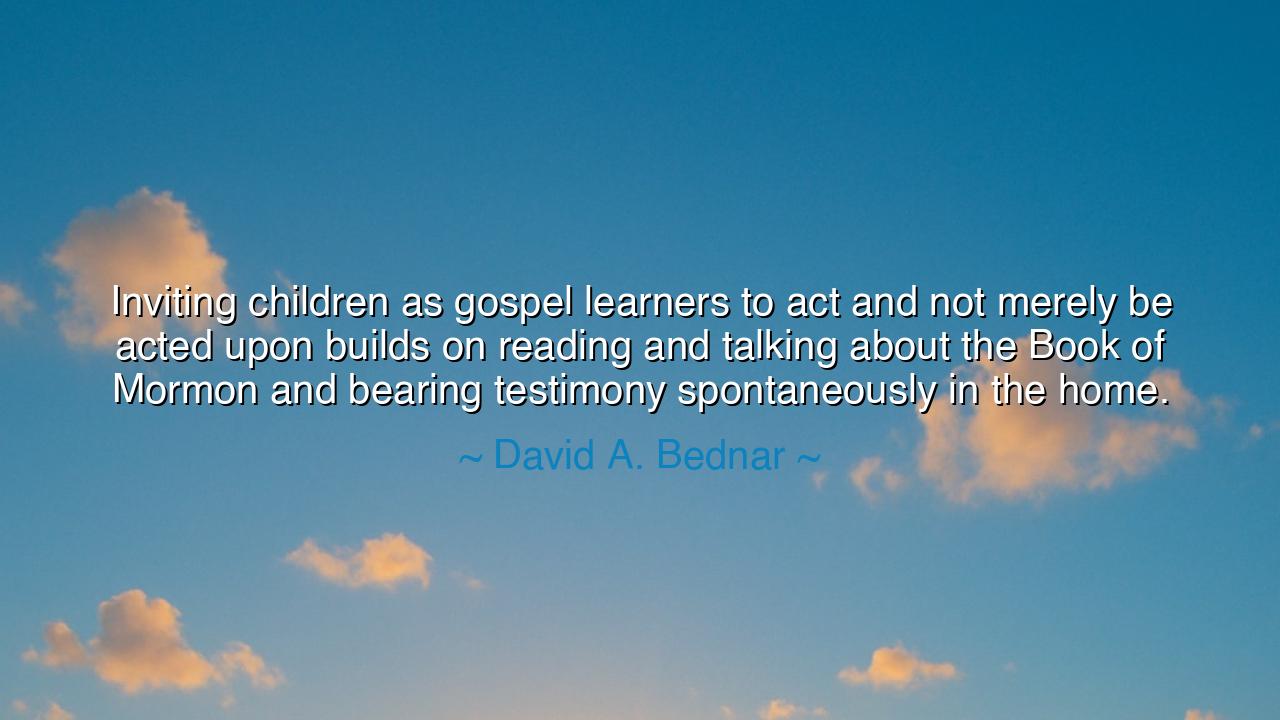
Inviting children as gospel learners to act and not merely be
Inviting children as gospel learners to act and not merely be acted upon builds on reading and talking about the Book of Mormon and bearing testimony spontaneously in the home.






The spiritual teacher and apostle David A. Bednar once spoke with great insight: “Inviting children as gospel learners to act and not merely be acted upon builds on reading and talking about the Book of Mormon and bearing testimony spontaneously in the home.” At first, these words may seem instructional, yet they carry within them a truth of eternal weight — a truth not only about teaching faith, but about the divine principle of agency, the sacred power to choose, to act, to become. In these few lines, Bednar reminds us that true learning, especially of spiritual things, cannot be received passively; it must be lived, experienced, and chosen by the heart.
To act and not merely be acted upon is one of the oldest and most sacred teachings in scripture. It echoes the words of the prophet Lehi, who declared that men and women “are free to choose liberty and eternal life.” To teach a child the gospel, then, is not to fill their mind with memorized truths, but to awaken within them the power to seek, question, and live those truths. Bednar’s counsel is a call to the soul — to parents, teachers, and believers alike — to move beyond instruction and toward inspiration. For when children learn to act, they do not simply inherit faith; they become it.
The ancients understood this same principle. The philosopher Aristotle taught that we become virtuous not by knowing what is good, but by doing what is good — by forming habits of the soul. Likewise, Bednar urges families not to let faith remain a mere conversation, but to transform it into a pattern of life. To read the Book of Mormon and bear testimony is not enough unless those words stir the spirit to action — to kindness, to prayer, to service, to courage. The living gospel, like fire, must be kindled by practice; it cannot be sustained by knowledge alone.
Consider the story of young Joseph Smith, who as a boy did not simply hear the teachings of the gospel but acted upon them. Troubled by the divisions of religion, he sought wisdom in the scriptures — and upon reading, he chose to pray. That single act, born of faith and initiative, opened the heavens and changed the course of history. His life stands as the very embodiment of Bednar’s teaching: that to learn spiritually is to act spiritually. When a heart moves from hearing to doing, revelation follows.
In his counsel, Bednar also speaks of the home — that sacred first temple where children learn who they are and what they believe. The home is not meant to be a lecture hall, but a place of living testimony. When parents bear witness spontaneously, when they speak of the Savior naturally and sincerely, they plant seeds of faith deeper than any sermon could reach. A child who sees faith in action — in the gentleness of forgiveness, in the quiet strength of prayer, in the joy of service — learns the gospel not by command, but by reflection. The spirit of the home becomes the teacher, and love becomes its language.
Yet there is another layer of Bednar’s wisdom — a warning as much as an invitation. For in an age where so many are content to be acted upon — by technology, by culture, by distraction — he calls for a generation of doers, of seekers, of disciples who will rise and take ownership of their souls. To teach a child to act is to teach them to be free, to discern truth for themselves, to walk upright even when the world invites them to kneel to comfort and conformity. Such teaching does not make life easier; it makes it eternal.
So, my listener, take this message to heart: whether you are a parent, a mentor, or a child of faith yourself, remember that truth is not a gift handed to the idle — it is a treasure discovered by the active soul. Read the scriptures not as words but as invitations. Speak your faith not as habit but as living testimony. Act in kindness, in courage, in humility, and you will find that your heart — and the hearts of those you love — will awaken to divine understanding. As David A. Bednar teaches, the gospel is not merely to be known; it is to be lived. And when we live it — when we act, not merely be acted upon — heaven itself moves closer to our homes, and the light of faith burns bright within the generations to come.






AAdministratorAdministrator
Welcome, honored guests. Please leave a comment, we will respond soon